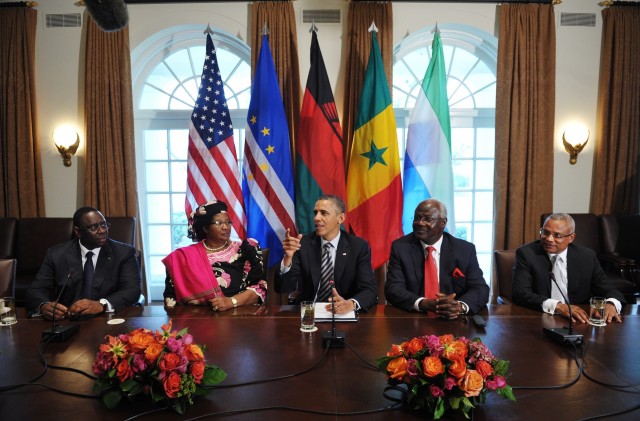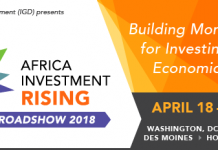President Obama will emphasize to African leaders in August that the United States is a committed partner in their continent’s economic development, but fighting in the U.S. Congress over whether to extend the life of the U.S. Export-Import Bank could dilute his message.
Ex-Im Bank anchors the president’s Power Africa initiative to double access to power in sub-Saharan Africa, where more than two-thirds of the population currently is without electricity and more than 85 percent of those living in rural areas lack access. Of the $7 billion the Obama administration has committed to the initiative over the next five years, Ex-Im is expected to put up $5 billion to support U.S. exports for the development of power projects.
Announced in June 2013, the initiative was enthusiastically welcomed in Africa. But, as more than 40 African heads of state and government prepare to descend on the U.S. capital for the inaugural U.S.-Africa Leaders Summit from Aug. 4 to 6, U.S. lawmakers remain embroiled in an acrimonious fight over reauthorization of Ex-Im’s charter, which expires on Sept. 30.
The Leaders Summit is the largest single event any U.S. president has held with African heads of state and government. Under the banner, “Investing in the Next Generation,” the summit aims to promote the administration’s focus on trade and investment in Africa while highlighting its commitment to the continent’s security, democratic development, and people.
A daylong business forum hosted by the U.S. Department of Commerce and Bloomberg Philanthropies on Aug. 5, the eve of the actual leaders summit, is intended to bolster the administration’s commercial engagement efforts. The hope is that the 200 African and U.S. CEOs attending the forum will create partnerships that will promote trade and encourage investment, particularly in the areas of finance and capital goods; infrastructure; power and energy; agriculture; consumer goods; and information and communication technology.
U.S. Commerce Secretary Penny Pritzker predicts that close to $1 billion in new deals will be struck at the forum.
The summit comes one week after some 500 young African leaders gathered in Washington to discuss the U.S.-African relationships and share ideas about the future of a peaceful and prosperous Africa as part of President Obama’s Young African Leaders Initiative.
Administration officials insist that U.S. business has a huge role to play in the future growth of Africa, a continent that is home to some of the world’s fastest growing economies, most of them south of the Sahara Desert.
“Sub-Saharan Africa presents many opportunities for U.S. companies,” says Enrico “Rick” Angiuoni, point person on Africa in Ex-Im’s Office of Business Development.
He concedes, however, that “the level of U.S. exports to the region is a challenge.”
U.S. merchandise exports to sub-Saharan Africa totaled $24 billion in 2013, accounting for just 1.5 percent of the country’s total exports to the world. Small and medium-sized businesses, whose best chances lie in agriculture and consumer goods, and as suppliers to big corporations operating in Africa, are still reluctant to enter the world’s largest emerging market out of an exaggerated sense of risk.
Ex-Im is open for business in 42 sub-Saharan countries, ready to facilitate purchases of U.S. goods by buyers in those countries. Its current exposure in the region is concentrated in just seven countries: Ethiopia ($1.7 billion); South Africa ($1.1 billion); Kenya ($1 billion); Ghana ($605 million); Angola ($357 million); Nigeria ($111 million); and Cameroon ($35 million).
The bank is eager to expand this portfolio and is reaching out to the U.S. African Diaspora to stress that point. In 2012, the bank renewed its Short-Term Africa Initiative through March 31, 2015, supporting U.S. exporters selling to 18 countries in sub-Saharan Africa. Angiuoni speaks of a “robust” pipeline of transactions in power, aviation, rail, mining, civil works, and oil and gas in Angola, Ethiopia, Ghana, Kenya, Mauritania, Mozambique, Nigeria, Tanzania and Zambia.
Financing for transactions in the aviation sector alone amounts to 64.2 percent of the bank’s entire sub-Saharan portfolio, followed by power projects at 22.1 percent; transportation and warehousing at 4.7 percent; construction at 3.8 percent; and manufacturing at 1.8 percent.
In April, Angiuoni projected that by the end of July the bank’s total authorizations in sub-Saharan Africa for the current fiscal year would exceed $1.5 billion, an all-time high, and possibly exceed $2 billion with more than 200 transactions by the end of the fiscal year on Sept. 30.
Never before has extending the life of the bank come under such assault on Capitol Hill.
The charter was last extended in 2012 with a number of required reforms, which the bank has implemented.
This time around, Republicans are deeply divided on the issue, with conservatives in both the House of Representatives and the Senate accusing the bank of being a purveyor of corporate welfare, crony capitalism, and an intrusion in the marketplace.
Those are arguments that Democrats normally make. However, delighting in Republican turmoil, the party has thrown its support behind reauthorization.
The U.S. Chamber of Commerce and National Association of Manufacturers (NAM), both longtime supporters of the Republican party), along with governors whose state economies and workers benefit from exports, say failure to reauthorize Ex-Im will put businesses of all sizes at a disadvantage in the global economy and cost U.S. jobs.
“In today’s global economy, manufacturers in the United States must compete on quality, price, reliability and on-time delivery. These companies should not be left without vital Ex-Im services and lose business because foreign countries provide official export financing to support their companies,” argues NAM President and CEO Jay Timmons.
Indeed, China last November said it would extend $1 trillion of loans to Africa by 2015, most of it via the Export-Import Bank of China. China’s trade with the continent exceeded $200 billion last year, more than double that of the U.S.
Lawmakers will have just a few legislative days to decide on reauthorization when they return from their August recess.
The wrangling in and beyond Congress over Ex-Im’s reauthorization adds to uneasiness among Africans about U.S. commitment to the continent, despite President Obama initiatives. Some of the leaders attending the summit already worry that they will be lectured by President Obama, that they will have little opportunity to give voice to their desired outcomes, and that by going to Washington, D.C., at his behest they will not be seen as meeting with the president of the United States on equal footing.
Amid the summit’s pomp and circumstance, they will be closely watching for clear signs of sincere commitment and mutual respect.
The White House, meanwhile, is adamant about the outcome of the historic summit, insisting, “at its core, this Summit is about fostering stronger ties between the United States and Africa.”













